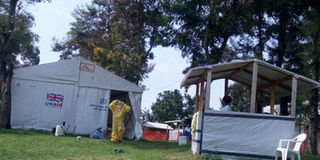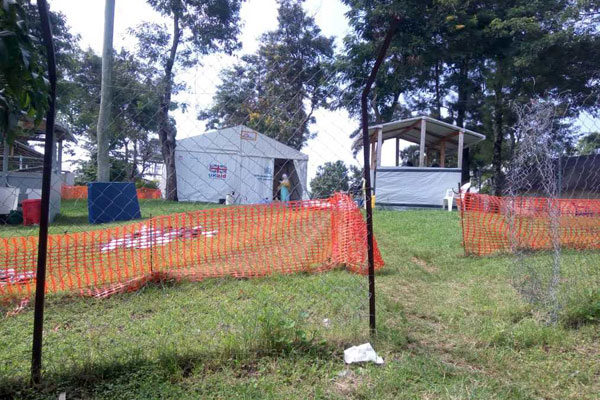11 things government is doing to contain Ebola outbreak in Kasese

A medical officer at the isolation centre set up in Bwera, Kasese District where the five-year-old boy who tested positive for Ebola died on June 11, 2019. Photo by Joel Kaguta
What you need to know:
- According to the WHO, Uganda vaccinated nearly 4,700 health workers in 165 facilities with an experimental drug designed to protect them against the virus.
- Ebola is transmitted to people from wild animals and spreads among humans through close contact with the blood, body fluids, secretions or organs of an infected person.
The health ministry on Wednesday confirmed three Ebola cases in Uganda after a five-year-old boy who had travelled with his mother from the Democratic Republic of Congo died at the isolation camp in the western district of Kasese.
There are two new confirmed cases of Ebola virus disease (EVD) in Kasese, according to the Health ministry.
The confirmed cases include the 50-year-old grandmother and a three-year-old brother to the deceased.
Blood samples were drawn and sent for testing at the Uganda Virus Research Institute (UVRI) and both samples tested positive for Ebola, according to the ministry of health.
Eight other people in contact with the family had been tracked down and were being monitored, the health ministry said.
"The ministry of health re-echoes its call on the general public to cooperate with the immigration, health and security officials to ensure effective screening at all entry points to prevent the spread of Ebola to other parts of the country," the ministry's Director General Health Services, Dr Charles Olaro said in a statement issued on Wednesday.
READ:
In order to contain the Ebola outbreak, government is working with partners to undertake the following measures;
• The minister of health, director general health services, country representatives, World Health Organisation-Uganda have arrived in Kasese District to assess and evaluate the situation on ground.
• Rapid response teams are on ground to assess the situation and support the district teams to continue with the response activities such as; contact tracing, case management including safe and dignified burial, surveillance, risk communication and psychosocial support.
• The ministry of health and WHO will undertake ring vaccination of contacts to the case and other non-vaccinated frontline health and other workers beginning June 14, 2019.
• The ministry would like to assure the public that the vaccine is very safe and effective and contacts or frontline health and other workers identified for vaccination should willingly take the vaccine for their own and family protection.
• The government of Uganda has developed and finalized a 72-hour costed comprehensive response plan.
• Government appeal to the public
• Always wash your hands with soap and clean water.
• Government of Uganda appeals to communities in all DRC-Uganda border districts to suspend market days, mass gatherings such as in places of worship, burials, wedding.
• Report any suspected cases with signs and symptoms such as unexplained bleeding from anybody openings, vomiting blood, bloody diarrhoea, muscle pain, headache, fatigue, abdominal pain and sudden unexplained death to the nearest health facility.
• Suspend social norms like shaking hands and hugging.
• Avoid touching a patient suspected to have Ebola.
High alert
East Africa has been on high alert since the outbreak in the eastern DRC.
According to the WHO, Uganda vaccinated nearly 4,700 health workers in 165 facilities with an experimental drug designed to protect them against the virus.
South Sudan has also declared a state of alert and vaccinated health workers.
Uganda has experienced several outbreaks in the past, most recently in 2012, while in 2000 more than 200 people died in an outbreak in the north of the country.
The Red Cross said it was scaling up efforts to contain the spread of the virus since it was detected in Uganda.
"This is a worrying development, but we have been preparing for this day for months now," Robert Kwesiga, Uganda Red Cross Secretary General, said in a statement Wednesday.
The DRC has struggled to contain the outbreak which was first recorded in North Kivu province and then spread to neighbouring Ituri and has left over 1,300 dead.
Efforts to tackle the crisis have been hampered both by militia attacks on treatment centres and by the hostility of some local people to the medical teams.
Five workers have been killed, according to an AFP tally, and important preventative work, such as vaccination programmes and burials of Ebola victims, has been delayed.
The outbreak is the 10th in Democratic Republic of Congo since the disease was identified in 1976.
It is the worst on record after an epidemic that struck Liberia, Guinea and Sierra Leone between 2014-2016, leaving more than 11,300 people dead.
Ebola is transmitted to people from wild animals and spreads among humans through close contact with the blood, body fluids, secretions or organs of an infected person.



